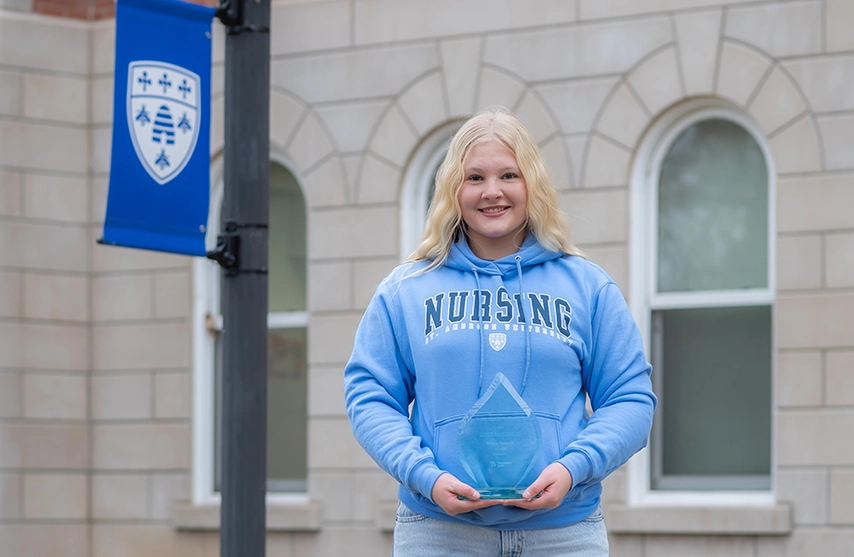When St. Ambrose University student Brenna Teerlinck ‘27 learned she had been inducted into the Fresenius Kabi National Blood Donation Hall of Fame, she didn’t believe it at first. At only 19 years old, she became the youngest person ever to receive the honor.
“My mom sat me down and showed me the email, and I didn’t even know what to think at first. I was so surprised,” Teerlinck said.
The award recognizes individuals nationwide who demonstrate extraordinary commitment to blood donation. For Teerlinck, the honor is deeply personal. Her cousin Trevor, who suffered from an immune system disorder, received 588 units of blood throughout his life.
“I saw in my own eyes that these other people's blood donations were able to give him one more birthday, one more Christmas, and time with his family,” she said. “That’s really what started it.”
Trevor played a major role in her childhood. After losing her father and brother at a young age, Teerlinck says Trevor’s dad stepped into that father figure role for her, supporting her throughout her life.
“Making him proud is really important to me,” she said.
A First Donation that Sparked Purpose
Despite her fear of needles, Teerlinck donated blood for the first time at age 16 during the family’s annual Trev Strong Blood Drive on May 16, Trevor’s birthday.
“It was really scary. I’ve always hated shots and getting my blood drawn,” she said. “But I was surrounded by my whole family. I thought it would be better to do it there.”
She started by giving a smaller amount during her first donation and later had a mild reaction, but it didn’t discourage her.
“It didn’t stop me, because that’s minor compared to what other people went through,” Teerlinck explained.
The family reached a meaningful milestone during one of the recent drives: 588 units collected, matching the amount of blood Trevor received.
Recognition and a Renewed Commitment
At her induction ceremony at ImpactLife headquarters in Davenport, Teerlinck received a plaque and a framed photo. What meant the most, though, was her family’s reaction.
“It definitely made my family so proud to see me do that. It was really important to them,” Teerlinck said.
The honor also reignited her passion for sharing her story. “Whether I was or wasn’t recognized, I was going to keep doing what I was doing,” she said. “But it was an extra push to keep me going.”
Continuing Her Mission at St. Ambrose
While the national attention brought new visibility to her story, Teerlinck says attending St. Ambrose University has helped her continue spreading awareness.
Since starting college, she has shared her story with classmates and friends, many of whom donated for the first time after hearing what blood donation meant to her. One friend, Ellie, attended Teerlinck’s induction ceremony and immediately wanted to sign up.
“That was really important, because that’s where my story helps and motivates people,” Teerlinck said.
She credits the supportive and close-knit SAU community for helping her speak openly.
“It’s not too big of a campus, so I’m able to have personal relationships and tell my story easier,” she said. “And it’s a very welcoming school. I’m not scared to talk about my story.”
Finding Her Calling
Her experience with blood donation also helped shape her academic goals. Teerlinck is majoring in nursing and is expected to graduate in December 2027.
“I find a lot of joy in helping people. That’s what brings me happiness,” she said.
She was inspired not only by her cousin’s story but also by clinical experiences during a CNA class – and by her mom, who is also a nurse.
Working at a hospital has reaffirmed her path. “It’s such a rewarding job,” she said. “Hearing your patients thank you for what you’re doing – that's what it’s all about.”
Advice for First-Time Donors
For students who may be nervous about donating blood, Teerlinck speaks from experience.
“The feeling of being rewarded for what you’re doing overpowers any of the nerves,” she said. “I feel so warm and happy inside after I donate because I know I just did something good.”
And her message comes with reassurance: “It’s not nearly as bad as you think. It’s fast. They’re good at what they do. And you’re helping someone who’s going through a lot more than just a little poke.”
For Teerlinck, every donation – her own or someone else’s – is a reminder of Trevor and the time blood donation gave him.
“Blood donation gave Trevor time,” she said. “And that’s something I’ll never forget.”



